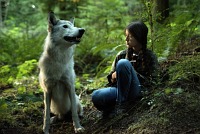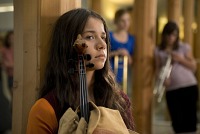A drawling girl, an old violin and a wolf are the ingredients of Shana’s coming-of-age story.
 As a Canadian First Nations girl the future doesn’t seem to have many options in store for her. Until, a teacher recognises her extraordinary gift. With nothing but a violin under her arm, Shana goes on a spiritual journey: guided by a wolf and by her musical talent, she reconnects with the First Nations culture and with her deceased mother. Italian-Swiss director Nino Jacusso (with a background as documentary maker) spent months with the ‘People of the Creeks’ and came back with a story that equally shows and deserves deep respect.
As a Canadian First Nations girl the future doesn’t seem to have many options in store for her. Until, a teacher recognises her extraordinary gift. With nothing but a violin under her arm, Shana goes on a spiritual journey: guided by a wolf and by her musical talent, she reconnects with the First Nations culture and with her deceased mother. Italian-Swiss director Nino Jacusso (with a background as documentary maker) spent months with the ‘People of the Creeks’ and came back with a story that equally shows and deserves deep respect.
Nino Jacusso: When my daughter asked me why I never made films for an audience of her age, I realised it was my last chance, now she’s at the age of 10. I asked her what she’d like to see on screen and she answered: “stories about other cultures, like Indians.” I once made a documentary about the author Federico de Cesco, who published several novels about the First Nations people. ‘Shana the Wolf Girl’ was the one that touched me the most. But I wanted to create something new, not just an upgrading from letters into images. When transposing from one medium into another, I wanted to add new elements to a story while preserving its original spirit. Federico gave me her blessing.
 How did you do that?
How did you do that?
Jacusso: We took the story to Canada, as I wanted to get ‘inside’ the First Nations culture. I approached it like a scholarship, just like I always work.
Before I ask you any other question, please tell me what would be the correct vocabulary to use regarding native Indians?
Jacusso: In America ‘Indian’ doesn’t sound nice. I suggest you’d say ‘First Nations’, which includes all Indian people in North America. Talking about smaller communities, you don’t say ‘tribe’ but ‘band’. We made the film with the Lower Nicola Band.
The film was shot in the Nicola Valley. Why was this the perfect place?
Jacusso: Sometimes you have to trust your feelings. We went to the chef and talked to the elders. I could read their minds: What do they want from us? I explained: our story is no more than a bone, now I want your help to put the meat around it. “But where are the actors? When white people come to us, they bring their own stars.” – “No, all actors should be from your band.” They came to understand that people from the old continent make films in a different way than Americans. An old woman said: “If you want to build a bridge between both continents, we’ll need a bigger bridge, because there is an ocean between us.”
They must have really trusted you.
Jacusso: First I tried to pick up a few words in their native language. Luckily my Swiss language enabled me to make some of those typical deep throat sounds. Then I made them a promise: after the editing, you’ll be the first to see the result. When we organised the screening in a local school, the audience couldn’t believe its eyes! One of the elders said to me: “Now your film is a part of our culture. It can go out into the world with our blessing.”
What input did the Lower Nicola people have in the script?
Jacusso: They told me that a First Nations girl at the age of 15 is already a woman. So we made Shana a bit younger. And we’ve sent her on a vision quest, which is a common ritual: spending 3 days and nights out in the woods. That’s when you meet your ancestors or your power animal. Afterwards you’ve grown from a child into a teenager, on your way to adulthood. This one aspect really comes from the heart of the First Nations people.
Did you never fear those scenes would look odd to our Western eyes?
Jacusso: I insisted on staying true to their reality, which is not the same as ours. First Nations explained to me how it is exactly to meet your ancestors: “We can see them, not with our eyes, but with our feelings.” There is more to life than the material world. After the recent school screenings children wrote letters to me that touched me deeply: ‘What I loved the most was the way Shana talked to her mum…’
Was it easy to make both cultures meet on the set?
Jacusso: My roots are Italian. Living with First Nations to me felt very much like Italy: big mama’s, warm family relationships, enjoying food and laughing together. We delved deep into a culture where spirituality is lived intensively. When looking for a lead actress, the shaman woman told us we didn’t search the right way. A ceremony was needed in which we should ask for guidance. The ceremony was held at 5 in the morning, in the afternoon we found Sunshine O’Donovan. I ran to the shaman: “We found her!” – “What did you think? Would you white people do something and not believe in it?”
More stories?
Jacusso: We had a ‘spiritual guard’ watching over the set. “I’m praying nobody is getting sick and nothing goes wrong.” One day rain was forecasted when we needed dry weather. He said: “I’ll pray for you.” That day the sky was black all over the high plateau, except in our village. When I expressed my gratitude he said: “You asked for this”. For another scene we needed the wind to blow through Shana’s hair. “When do you need the wind?” – “Around 4 o’ clock.” Next day at 4, the wind came up. Leaving for Vancouver to shoot the last scenes, he told me he couldn’t protect us there. Arriving on Vancouver Island, it started raining for a whole week. Spirituality is not a question of being real or not… It is just like it is.
You assimilated many problems of the First Nations society nowadays in one story: alcohol, unemployment, lack of education…
Jacusso: We couldn’t keep it realistic without mentioning alcoholism. But Marcel Shackelly (playing Shana’s father) told me we were too importunately: “An alcoholic tries to hide his failure. Even when being drunk I still tried to be a loving father for my daughter.”
What about education?
Jacusso: There is no easy education in the reserves. White teachers there are the ones who can’t find a job in the white world.
Are there other specific problems brought up in the film that maybe I didn’t notice at first glance?
Jacusso: The teenagers hanging around at the shop at night. When you’re young and you want to conquer the world, you don’t want to stay in a place like that. But what if they leave their grounds? As a red skin in a white world you’ll always be second class. The signs of racism we saw in Canada were shocking, and in the US the situation might be even worse.
We had 3 cultures on the set: Swiss, Canadian and First Nations. Between Canadians and First Nations you could feel the wound is still very deep and it will take generations to heal it. What we did was not only film work; it was also ‘peace work’: proving it is possible to work together, even when you’re not of one mind.
Sometimes you consequently use a wolf’s point of view through colour-upgraded images. Is this really how a wolf sees the world?
Jacusso: We came very close to a wolf’s hearing and seeing. The human ear can capture 20.000 Hz, a wolf captures 80.000 Hz. I looked up the colour gradation that wolves can see and approximated it very closely in the colour correction. What you get is really a wolf’s sensory feeling.
How difficult was it to work with the animal?
Jacusso: ‘Our’ wolf also did a TWILIGHT episode and came with 3 trainers. All I did was explain to them my wishes. You can ask a wolf to do a scene 3 times, but the 4th take he will simply refuse. He gets the idea you’re teasing him. My advice to all directors: be prepared for smart wolves!
What exactly does the wolf stand for?
Jacusso: He is Shana’s power animal with whom she can connect. In the scene when she’s fighting two hunters, it’s the power animal inside her taking over. At the end of the movie Shana has grown up. The wolf is now inside her, she can recall him in times of need.
Music is another important element in the film.
Jacusso: The first thing man did was probably pray, sing and drum. Music is so old that it touches the deepest cells in our body and soul. For First Nations music it is a direct connection to the creator. Music is like fire: there is something there but you can’t touch it, like a ghost, a spirit. This 90’ long movie contains 48’ of music.
Our composer Roman Lerch is very talented. Our discussions became a profound part of the script writing process. His music could build a bridge between both worlds. I’m very proud about the result and about producer Franziska Reck trusting me: Roman is very young, but I knew he could do it. His music score won the 2014 Swiss Music Award.
As passionate as Shana is in her violin playing, as apathetic she seems to stand in life. Did you have to force Sunshine O’Donovan to act so small and sober?
Jacusso: We’re used to the mainstream way of acting that is very much like: “Spotlight on me… I’m an ego maniac taking you on an emotional rollercoaster ride”. After 120 years of cinema tradition, maybe it’s time for something different. When meeting famous First Nations people, you’ll usually find them very quiet. The more capable and noble you are, the less you have to show it. In Japan I went to a star restaurant, ran by a respected chef. In the kitchen was one man slicing onions and one young man making a show cooking performance. When expressing my appreciation for his skills, I was told: the great chef is the one slicing the onions.
Gert Hermans
